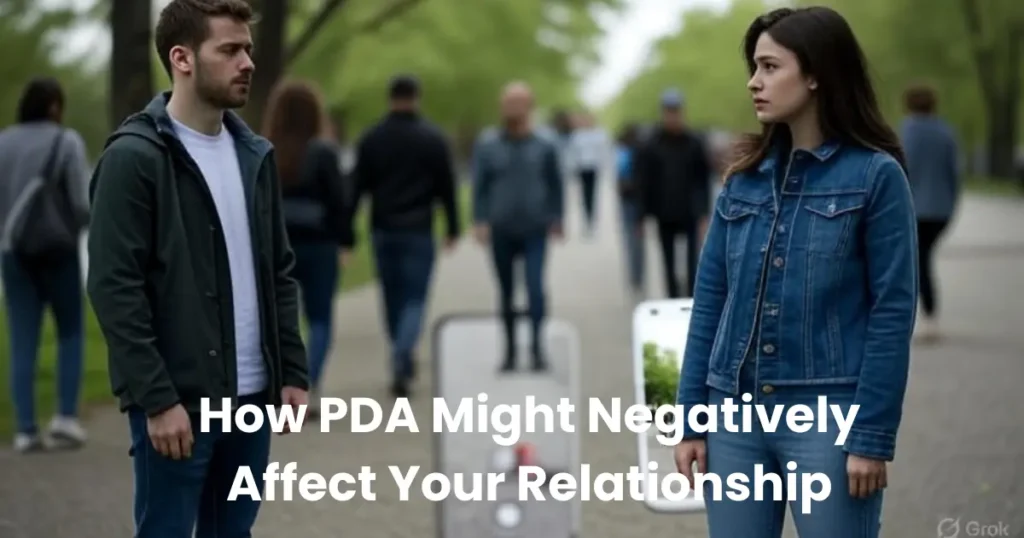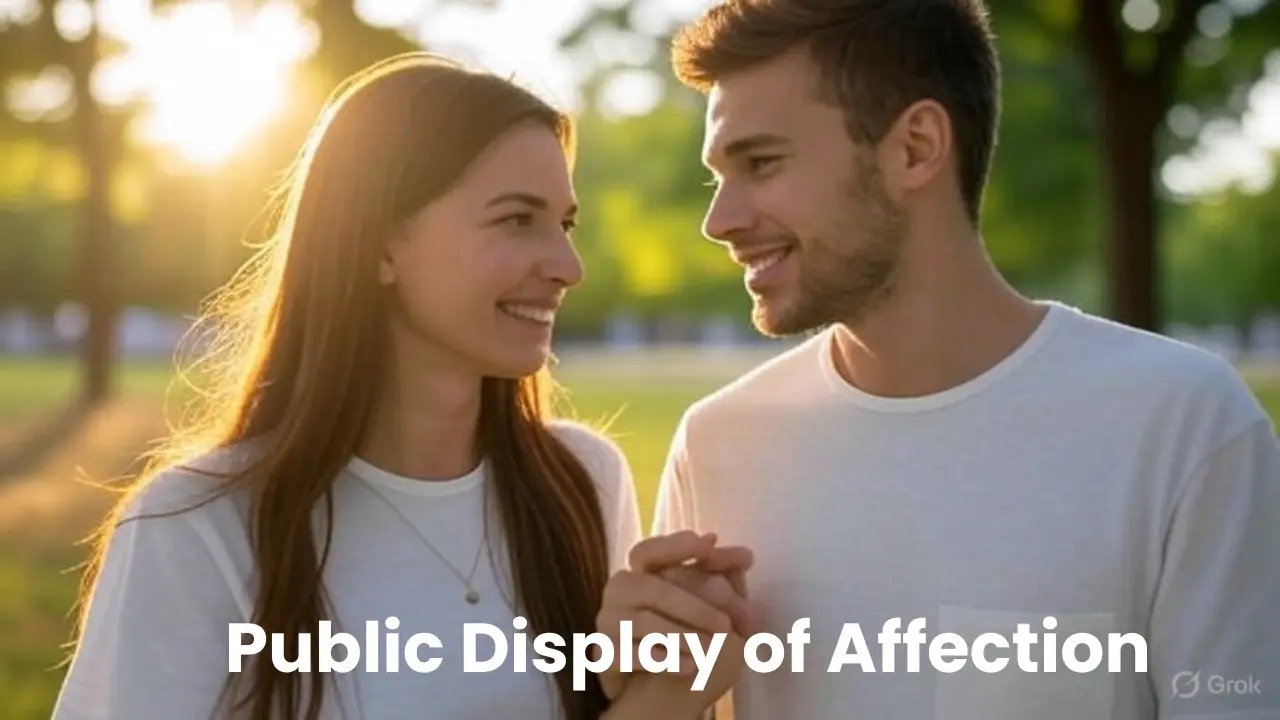Last updated on February 6th, 2026 at 01:01 pm
You have probably seen couples holding hands in the park or sharing a quick kiss before saying goodbye. This is called Public Display of Affection, or PDA. But what exactly does PDA mean in a relationship? Is it good or bad? Should you and your partner do it?
In this guide, we’ll explain what PDA is, why some couples like it while others don’t, its benefits and drawbacks, and how to talk about PDA with your partner.
Key Takeaways
- PDA means showing love physically in public, like hugs or kisses.
- It is common and can make your relationship stronger.
- Comfort with PDA depends on culture, personality, and upbringing.
- Talk with your partner to set boundaries that work for both of you.
- There is no right or wrong—only mutual respect.
What is Public Display of Affection? (PDA Meaning)
Public Display of Affection (PDA) means any physical touch or loving gesture between couples that happens in a public place where other people can see. These moments can be small and sweet or more open and bold.
- PDA full form in relationship: In the context of relationships, PDA stands for “Public Display of Affection.”
- Meaning of PDA couple: A couple who shows love openly in public by holding hands, hugging, or kissing.
Examples of Public Displays of Affection
Here are some common PDA examples you might notice every day:
- Holding hands while walking
- Giving a quick kiss on the cheek or lips
- Putting your arm around your partner’s shoulder
- Leaning on each other while sitting
- Stroking your partner’s hair or face
- Whispering sweet words in their ear
- Winking or blowing a kiss
- Feeding each other a bite of food
- Sharing a long look or smiling at each other
📌 Fun fact: Even a small touch on your partner’s arm counts as PDA. It’s not about being dramatic—it’s about feeling connected.

Psychology Behind PDA: Why Do Couples Do It?
Couples show PDA for many reasons beyond just romance. Here’s what psychology tells us:
- Secure Attachment: People who feel safe and close to their partner are more comfortable showing love in public.
- Relationship Stage: New relationships often have lots of excitement, which leads to more Public Display of Affection.
- Cultural & Family Influence: How you grew up and your culture affect how okay you feel with PDA. which can be particularly relevant for understanding a lavender relationship.”
- Validation: Some people use PDA to show others, “I’m proud to be with this person.”
- Personality: Extroverts usually show more PDA, while introverts prefer to keep affection private.
“PDA can show how confident partners feel about their relationship,” says Dr. Sabrina Romanoff, Clinical Psychologist.
Benefits of PDA in a Relationship
A simple hug or holding hands can do more than just look nice. PDA can:
- Make emotional bonds stronger: Touch helps couples feel closer.
- Improve mood and reduce stress: Hugs release oxytocin, the “bonding hormone,” and lower stress hormones.
- Show commitment: PDA makes your partner feel loved and important, often reinforcing the bond in a monogamy relationship.
- Communicate without words: Sometimes a touch says “I love you” better than words.
- Create happy memories: Small moments become special memories.
- Did you know? Studies show couples who share moderate PDA often feel happier and more connected.
How PDA Might Negatively Affect Your Relationship
PDA is not perfect for every couple. Here are some problems it can cause:
- Different comfort levels: One partner may love PDA, but the other might feel shy or uncomfortable.
- Cultural or social judgment: Some cultures or places do not accept PDA or even make it illegal.
- Social media risks: Photos or videos of PDA can feel too personal or embarrassing.
- Feels fake or forced: If PDA is used to hide problems or prove something, it can hurt trust, a dynamic that can sometimes manifest in a karmic relationship.
“Setting boundaries takes courage but helps you love yourself and your partner better,” says a relationship therapist.

Common Myths About PDA
Let us clear up some wrong ideas about PDA:
- Myth 1: PDA means insecurity — Not true! For many, PDA is just a natural way to show love.
- Myth 2: Only new couples do PDA — Long-term couples enjoy it too.
- Myth 3: No PDA means no love — Some people just prefer to keep love private.
- Myth 4: PDA is always sexual — Holding hands or hugging is about connection, not sex.
How PDA Changes Across Relationship Stages
- Early Stage: PDA is often intense—lots of hand-holding, hugs, and kisses because everything feels new and exciting.
- Comfort Zone Stage: PDA becomes more natural and relaxed—like leaning on each other or sharing smiles.
- Long-Term Love: PDA is subtle and meaningful—touching your partner’s hand during a talk or putting your arm around them on a walk.
Every couple is different. There is no “right” amount of PDA—just what feels good for both of you.
Talking to Your Partner About PDA
If PDA ever feels awkward or uncomfortable, it is important to talk. Here is how:
- Find a quiet, private time to chat.
- Use “I” statements like, “I feel shy when we kiss in public.”
- Ask your partner what they feel comfortable with.
- Agree on boundaries together.
- Be patient and respectful.
“Talking openly about PDA helps you both feel respected and free,” says a relationship expert.
When is PDA Not Okay?
Sometimes PDA is not a good idea:
- At work or formal events.
- In places or cultures where PDA is not allowed or frowned upon.
- When one partner feels pressured or embarrassed.
- If PDA is used to get attention or distract others.
Always respect your partner’s feelings and the place you are in.
Is PDA illegal in the US?
No, PDA is not illegal in the United States. Holding hands, hugging, or quick kisses are normal and accepted in most public places.
But sexually explicit acts or indecent exposure are illegal. Also, in some countries like India or the UAE, even a simple kiss can lead to fines or arrest.
Final Thoughts: PDA is Personal
PDA is not good or bad—it is personal. It can be a sweet way to show love, but only if both partners agree. Respect, understanding, and honest talks matter more than any kiss or hug.
Whether you love public hugs or quiet moments at home, the best kind of love is the one that makes you both feel safe, loved, and happy.
FAQs
Is PDA healthy for a relationship?
Yes, if both partners feel comfortable. It can help build closeness.
What level of PDA is acceptable?
It depends on you, your partner, culture, and place. Respect is key.
Is PDA a red flag?
Not usually. But forced or too much PDA might show problems.
What are PDAs in relationships?
Any public physical gesture of love—like holding hands, hugging, or kissing.
What is PDA full form in relationship?
PDA stands for “Public Display of Affection.”
Is public display of affection (PDA) good or bad?
PDA can be good when both partners feel comfortable, as it strengthens bonds and shows love. But if one feels pressured or uncomfortable, it can cause problems. The key is mutual respect and communication.

